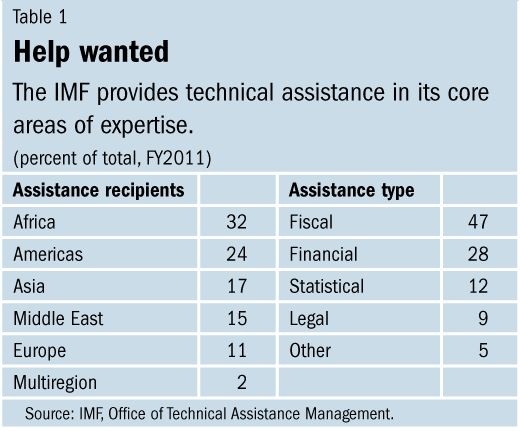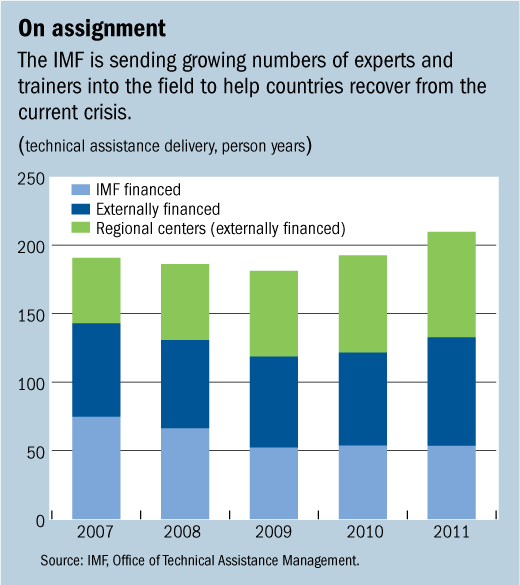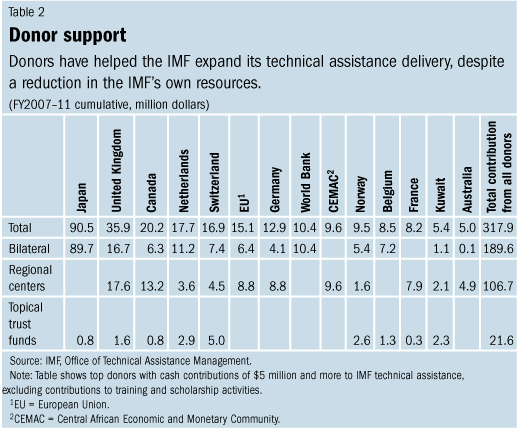
Typical street scene in Santa Ana, El Salvador. (Photo: iStock)
IMF Survey: Experts on Call: Global Crisis Boosts Demand for IMF Know-how
September 22, 2011
- IMF experts on the ground help member countries tackle global crisis
- Building institutions, training staff key to reducing country vulnerabilities
- Resources from more global partners now support IMF efforts in the field
The global economic crisis has intensified demand for IMF support on the ground, especially from crisis countries.

Street in Reykjavik, Iceland, where IMF technical assistance helped address fiscal risks revealed by economic crisis in 2008 (photo: Gavin Hellier/Corbis)
IMF TECHNICAL ASSISTANCE
As a result, besides its financial assistance, the IMF is sending growing numbers of experts and trainers into the field to help countries recover from the current crisis and to strengthen institutions.
As well as disbursing loans in times of crisis, the IMF also responds to member-country requests for technical assistance—for experts who can advise on international best practice and also personally help set up some of the entities and procedures that run modern national economies. This technical assistance thus expands countries’ capacity to keep their economies running efficiently.
Capacity building is one of the IMF’s core mandates, complementing its surveillance and lending work. The IMF provides technical assistance in its core areas of expertise—public finance, central banking and financial sector stability, macroeconomic and financial statistics, and related legal matters (see Table 1).

Through its training arm, the IMF Institute, the IMF provides practical, hands-on instruction in support of strategic priorities, encompassing courses on macroeconomic and financial market issues and courses delivered by the IMF’s specialized departments on individual topics.
Shift to crisis countries
Technical assistance and training respond to country needs and are expected to increase. Virtually all IMF members benefited from this type of support during FY2011 (see chart). Since the onset of the global economic crisis, a significant portion of technical assistance resources has been shifted to crisis countries.
Technical assistance to upper middle– and high-income countries rose to about one-third of total technical assistance in FY2011, up from less than 20 percent in FY2008. There has also been a shift in the composition of the training program: training on macrofinancial topics and financial market issues has increased considerably in recent years.

Building on recent trends, delivery is set to increase sharply in the coming year: technical assistance is expected to rise by approximately 20 percent, in particular to African countries, and training by 13 percent in FY 2012.
Results on the ground
IMF technical assistance has helped countries tackle the global crisis and build institutions for the future. In many countries, technical assistance was provided in multiple areas, addressing fiscal and debt issues and improving monetary operations and liquidity management and data issues.
Concrete examples for tackling the crisis in specific policy areas include
• Iceland: technical assistance from the IMF’s Fiscal Affairs Department helped address key sources of fiscal risks revealed by the economic and financial crisis that started in 2008. Advice has focused principally on strengthening budget preparation, cash management, fiscal oversight of local governments, and improving the equity and revenue productivity of the tax system. Considerable progress was made by the authorities in raising revenues to close the country’s fiscal gap. More recently, a team of experts has visited the country to assist in advancing the tax reform effort further and also to improve the taxation of natural resources. The IMF also provided a substantial amount of crisis-related technical assistance in the monetary and financial area.
• Hungary: In June 2010, fiscal experts worked with the Hungarian authorities to identify reform options that could deliver expenditure savings over the short and medium terms to attain its fiscal targets. Options focused on expenditure rationalization in the public sector wage bill, social benefits, and labor market policy reform. The government incorporated some of these adjustment measures in its recently introduced structural reform program.
Technical assistance examples of building institutions for the future include
• Poland: The IMF’s Statistics Department has provided technical assistance in improving Poland’s balance of payments statistics. The assistance reviewed in-depth research by the authorities into the reasons behind a high and increasing level of errors and omissions in recent years, and advised on areas of potential future investigations to improve the quality of external sector statistics. The assistance mission concluded that revisions to Polish balance of payments data scheduled to be published at end-June 2011 were based on appropriate compilation techniques.
• West Africa: In the context of its economic and financial integration, the West African Economic and Monetary Union commission requested the IMF’s assistance to revise and harmonize its public finance regulations and directives. During the period 2008–10, the IMF’s Fiscal Affairs Department helped the authorities draft five directives and guidelines related to fiscal transparency, organic budget laws, budget execution, accounting, and budget classifications. Similarly, the IMF’s Statistics Department helped draft a directive and guidelines related to the Common Reporting Format of Government Financial Operations. Ongoing support is provided by both departments for following up on implementation of the directives and assisting member countries through seminars and technical assistance missions.
• Peru: From August 2009 to April 2011, IMF legal experts assisted Peru in the development of a risk-based Anti-Money Laundering/Combating the Financing of Terrorism national strategy based on a systemwide assessment of threats and vulnerabilities. This strategy was the product of an innovative interagency process that will strengthen Peru’s institutional framework. It was officially approved by the Government in May 2011.
• Medium-term debt strategy: The IMF’s Monetary and Capital Markets Department has provided technical assistance to countries including Bangladesh, Ghana, Moldova, and Nicaragua in disseminating a medium-term debt strategy framework, thereby enhancing the authorities’ capacity to develop their own debt management strategies. Technical assistance in this area is closely linked to the new IMF policy on debt limits for low-income countries, particularly targeting recipients of debt forgiveness under the Multilateral Debt Relief Initiative, but it is adaptable to more advanced economies.
• Strengthening bank supervision: IMF staff are also building capacity of bank supervisors in Asia by deploying long-term resident advisors and short-term experts to help countries strengthen bank supervision and regulation through a risk-based supervisory approach, and to attain recognized international standards.
• East Africa: The global crisis brought back higher fiscal deficits and risk of debt burden in countries served by the IMF’s East African Regional Technical Assistance Center. In response, many countries began exploring the development of domestic debt markets and sought technical assistance through the center. IMF trainers were invited to offer a course on Macroeconomic Management and Debt Issues that covered these topics.
Donors make the difference
Donors have helped the IMF expand its technical assistance delivery, despite a reduction in the IMF’s own resources. In FY2011, about 75 percent of such assistance was financed by donors, up from about 60 percent in 2007 (see Table 2). The number of donors also increased, from 23 to 42, during this period.

The successful expansion of donor partnerships has been supported by a new financing strategy that expanded the network of Regional Technical Assistance Centers and introduced Topical Trust Funds to address needs requiring specialized interventions. Along with long-standing bilateral agreements that allow donors to target contributions to specific countries and fields of interest, regional centers and topical funds afforded donors opportunities to enter into multidonor partnerships that address technical assistance needs around the world.
Japan, the United Kingdom, Canada, the Netherlands, Switzerland, and the European Union are the top donors that committed to support IMF technical assistance during FY2007–FY2011. The complementary training program has also benefited considerably from increased donor support, with the volume of training in FY 2012 expected to be 20 percent above the FY 2009 level. The largest donors are Austria, Japan, Kuwait, and Singapore.
Is technical assistance effective?
Technical assistance is delivered in response to requests from member countries following an assessment of the country’s track record and the relative urgency of need. It is provided by specialized staff from IMF headquarters and by high-caliber experts hired for specific assignments. Their work is subject to quality control and is integrated with the IMF’s other activities—surveillance and lending.
The increase in external funding and the excess demand for technical assistance from IMF member countries, which requires strong commitment by recipient governments, is an indication that technical assistance is satisfying the clients. This is underscored by external evaluations of IMF technical assistance projects that have generally given good marks to effectiveness.
Experts agree that strong commitments on the part of the recipient authorities and timely follow-up to technical assistance recommendations are key to achieving the intended results on the ground. Surveys of IMF training undertaken by an independent market research firm indicate a high level of satisfaction among participants and their managers. These evaluations take the form of follow-up surveys on the effectiveness of individual course deliveries, a year to 18 months after delivery, and a triennial survey of agencies sending participants to IMF training.
■ Effectiveness and other issues will be discussed during a seminar on IMF technical assistance scheduled for the 2011 Annual Meetings.


